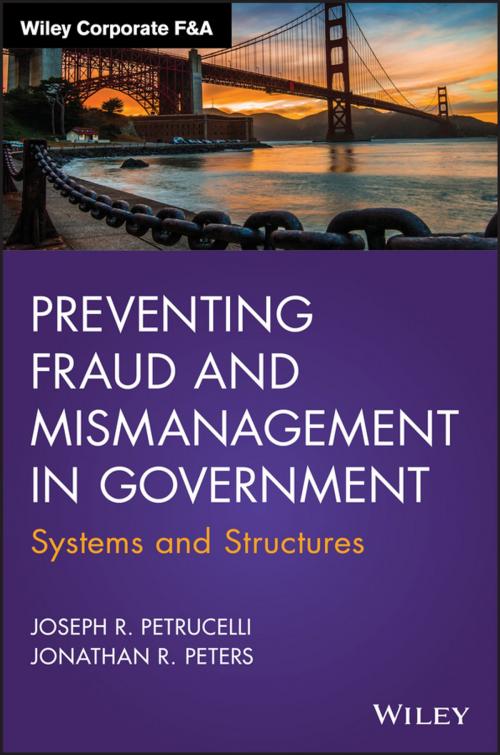Preventing Fraud and Mismanagement in Government
Systems and Structures
Business & Finance, Accounting, Auditing| Author: | Jonathan R. Peters, Joseph R. Petrucelli | ISBN: | 9781119220022 |
| Publisher: | Wiley | Publication: | October 11, 2016 |
| Imprint: | Wiley | Language: | English |
| Author: | Jonathan R. Peters, Joseph R. Petrucelli |
| ISBN: | 9781119220022 |
| Publisher: | Wiley |
| Publication: | October 11, 2016 |
| Imprint: | Wiley |
| Language: | English |
Dig to the root of public fraud with deep exploration of theory, standards, and norms
Preventing Fraud and Mismanagement in Government identifies common themes in public fraud and corruption, describes the forces that drive them, and provides an objective standard of good practices with no political bent. From Bridgegate to Iran-Contra, this book walks through the massive scandals that resulted from public mismanagement and fraud to illustrate how deeply-entrenched, entity-specific norms can differ from actual best practices. The discussion includes the theoretical underpinnings of public fraud, and how intense corporate culture and limited exposure to outside practice standards can lead to routine deviation from normal behavior and moral standards. You'll find a compendium of practices that illustrate actual norms, allowing you to compare your own agency's culture and operations to standard practice, and contrast the motivations for fraud in the public and private sectors.
Public agencies and governmental entities are generally driven by a pubic benefit or goal, but are widely varied in the ability and desire to deliver value while retaining best practices. This book explicitly explores the common patterns of agency practices and cultural norms, and describes how they can easily cross over into illegal acts.
- Understand why fraud exists in the public sector
- Discover how your agency's mindset diverges from the norm
- Review cases where agency practices diverged from best financial practices
- Learn good practices in an objective, nonpolitical context
The government/public sector provides some of the most basic services that are critical to a functioning society. Lacking a profit motive, these agencies nonetheless show a pattern of fraud and borderline behavior that could be mitigated with the adoption of standards and best practices. Preventing Fraud and Mismanagement in Government shares a canon of knowledge related to public operations and fraud, providing deep insight into the causes, solutions, and prevention.
Dig to the root of public fraud with deep exploration of theory, standards, and norms
Preventing Fraud and Mismanagement in Government identifies common themes in public fraud and corruption, describes the forces that drive them, and provides an objective standard of good practices with no political bent. From Bridgegate to Iran-Contra, this book walks through the massive scandals that resulted from public mismanagement and fraud to illustrate how deeply-entrenched, entity-specific norms can differ from actual best practices. The discussion includes the theoretical underpinnings of public fraud, and how intense corporate culture and limited exposure to outside practice standards can lead to routine deviation from normal behavior and moral standards. You'll find a compendium of practices that illustrate actual norms, allowing you to compare your own agency's culture and operations to standard practice, and contrast the motivations for fraud in the public and private sectors.
Public agencies and governmental entities are generally driven by a pubic benefit or goal, but are widely varied in the ability and desire to deliver value while retaining best practices. This book explicitly explores the common patterns of agency practices and cultural norms, and describes how they can easily cross over into illegal acts.
- Understand why fraud exists in the public sector
- Discover how your agency's mindset diverges from the norm
- Review cases where agency practices diverged from best financial practices
- Learn good practices in an objective, nonpolitical context
The government/public sector provides some of the most basic services that are critical to a functioning society. Lacking a profit motive, these agencies nonetheless show a pattern of fraud and borderline behavior that could be mitigated with the adoption of standards and best practices. Preventing Fraud and Mismanagement in Government shares a canon of knowledge related to public operations and fraud, providing deep insight into the causes, solutions, and prevention.















